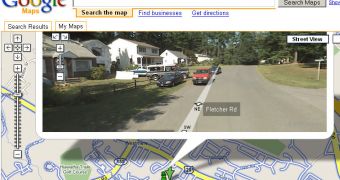Google Street View is questioned again, this time in Germany. Johannes Caspar, a data protection official from the country, threatened the Mountain View-based company earlier this week with “unspecified sanctions” if it didn't resolve the 12 issues that he had raised concerning German privacy law and how the Google application breached it. The search giant responded to most of the aforementioned problems, although it didn't offer any guarantees that the raw images would be removed after scrambling faces, license plates and other information had been processed.
The officials were happy with the response, praising Google for its promptness; however, they are still reserved, and their main concern now regards Google keeping the raw images, although the company has pledged to continue to collaborate with the authorities towards reaching an agreement. "After positive discussions with the German Data Protection Authorities we have made good progress towards finding solutions to their concerns about Street View," Google said in a statement.
Google Street View is a service that offers street-level images of many cities and important landmarks and is integrated into the company's Google Maps mapping service. It witnessed many controversies since it was launched in 2007 and has faced opposition in many countries. Greece's data protection banned Google in the country earlier this month asking for additional information from the company.
More recently, after numerous complaints in Japan, the search giant decided to reshoot all the photos in the country. Japan residents were concerned that Google Street View was invading their privacy with pictures of private areas. Because of the country’s unique architecture Google's cameras were above the walls of many residences allowing them to peek inside. The company has since lowered the height of its cameras by 13in and will shoot the whole country again, although it has already covered 12 cities. "We have lowered the height of the camera due to the unique characteristics of many Japanese roads; they tend to be narrow, without pavements and driveways, and houses are built close to the street," Google's statement said.

 14 DAY TRIAL //
14 DAY TRIAL //